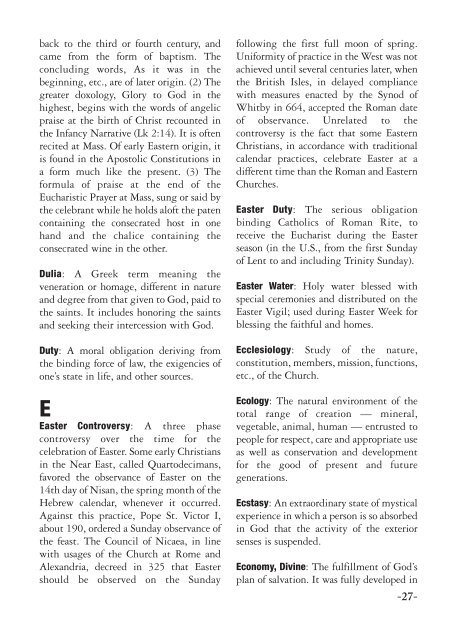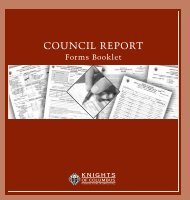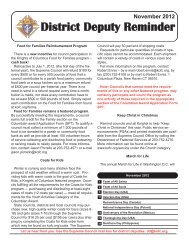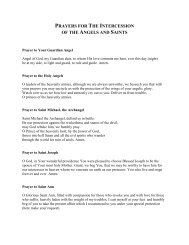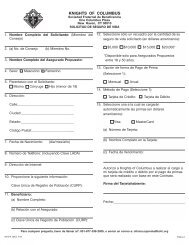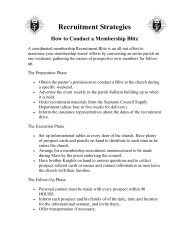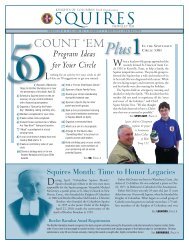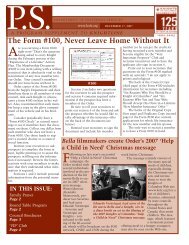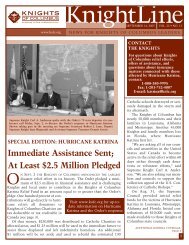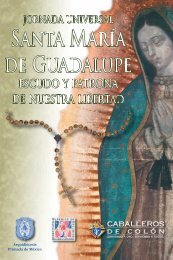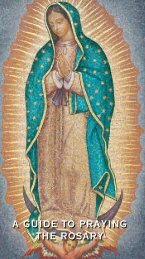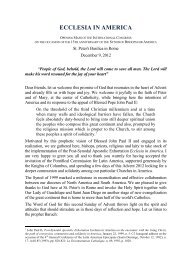CATHOLIC WORD BOOK - Knights of Columbus, Supreme Council
CATHOLIC WORD BOOK - Knights of Columbus, Supreme Council
CATHOLIC WORD BOOK - Knights of Columbus, Supreme Council
You also want an ePaper? Increase the reach of your titles
YUMPU automatically turns print PDFs into web optimized ePapers that Google loves.
ack to the third or fourth century, and<br />
came from the form <strong>of</strong> baptism. The<br />
concluding words, As it was in the<br />
beginning, etc., are <strong>of</strong> later origin. (2) The<br />
greater doxology, Glory to God in the<br />
highest, begins with the words <strong>of</strong> angelic<br />
praise at the birth <strong>of</strong> Christ recounted in<br />
the Infancy Narrative (Lk 2:14). It is <strong>of</strong>ten<br />
recited at Mass. Of early Eastern origin, it<br />
is found in the Apostolic Constitutions in<br />
a form much like the present. (3) The<br />
formula <strong>of</strong> praise at the end <strong>of</strong> the<br />
Eucharistic Prayer at Mass, sung or said by<br />
the celebrant while he holds al<strong>of</strong>t the paten<br />
containing the consecrated host in one<br />
hand and the chalice containing the<br />
consecrated wine in the other.<br />
Dulia: A Greek term meaning the<br />
veneration or homage, different in nature<br />
and degree from that given to God, paid to<br />
the saints. It includes honoring the saints<br />
and seeking their intercession with God.<br />
Duty: A moral obligation deriving from<br />
the binding force <strong>of</strong> law, the exigencies <strong>of</strong><br />
one’s state in life, and other sources.<br />
E<br />
Easter Controversy: A three phase<br />
controversy over the time for the<br />
celebration <strong>of</strong> Easter. Some early Christians<br />
in the Near East, called Quartodecimans,<br />
favored the observance <strong>of</strong> Easter on the<br />
14th day <strong>of</strong> Nisan, the spring month <strong>of</strong> the<br />
Hebrew calendar, whenever it occurred.<br />
Against this practice, Pope St. Victor I,<br />
about 190, ordered a Sunday observance <strong>of</strong><br />
the feast. The <strong>Council</strong> <strong>of</strong> Nicaea, in line<br />
with usages <strong>of</strong> the Church at Rome and<br />
Alexandria, decreed in 325 that Easter<br />
should be observed on the Sunday<br />
following the first full moon <strong>of</strong> spring.<br />
Uniformity <strong>of</strong> practice in the West was not<br />
achieved until several centuries later, when<br />
the British Isles, in delayed compliance<br />
with measures enacted by the Synod <strong>of</strong><br />
Whitby in 664, accepted the Roman date<br />
<strong>of</strong> observance. Unrelated to the<br />
controversy is the fact that some Eastern<br />
Christians, in accordance with traditional<br />
calendar practices, celebrate Easter at a<br />
different time than the Roman and Eastern<br />
Churches.<br />
Easter Duty: The serious obligation<br />
binding Catholics <strong>of</strong> Roman Rite, to<br />
receive the Eucharist during the Easter<br />
season (in the U.S., from the first Sunday<br />
<strong>of</strong> Lent to and including Trinity Sunday).<br />
Easter Water: Holy water blessed with<br />
special ceremonies and distributed on the<br />
Easter Vigil; used during Easter Week for<br />
blessing the faithful and homes.<br />
Ecclesiology: Study <strong>of</strong> the nature,<br />
constitution, members, mission, functions,<br />
etc., <strong>of</strong> the Church.<br />
Ecology: The natural environment <strong>of</strong> the<br />
total range <strong>of</strong> creation — mineral,<br />
vegetable, animal, human — entrusted to<br />
people for respect, care and appropriate use<br />
as well as conservation and development<br />
for the good <strong>of</strong> present and future<br />
generations.<br />
Ecstasy: An extraordinary state <strong>of</strong> mystical<br />
experience in which a person is so absorbed<br />
in God that the activity <strong>of</strong> the exterior<br />
senses is suspended.<br />
Economy, Divine: The fulfillment <strong>of</strong> God’s<br />
plan <strong>of</strong> salvation. It was fully developed in<br />
-27-


